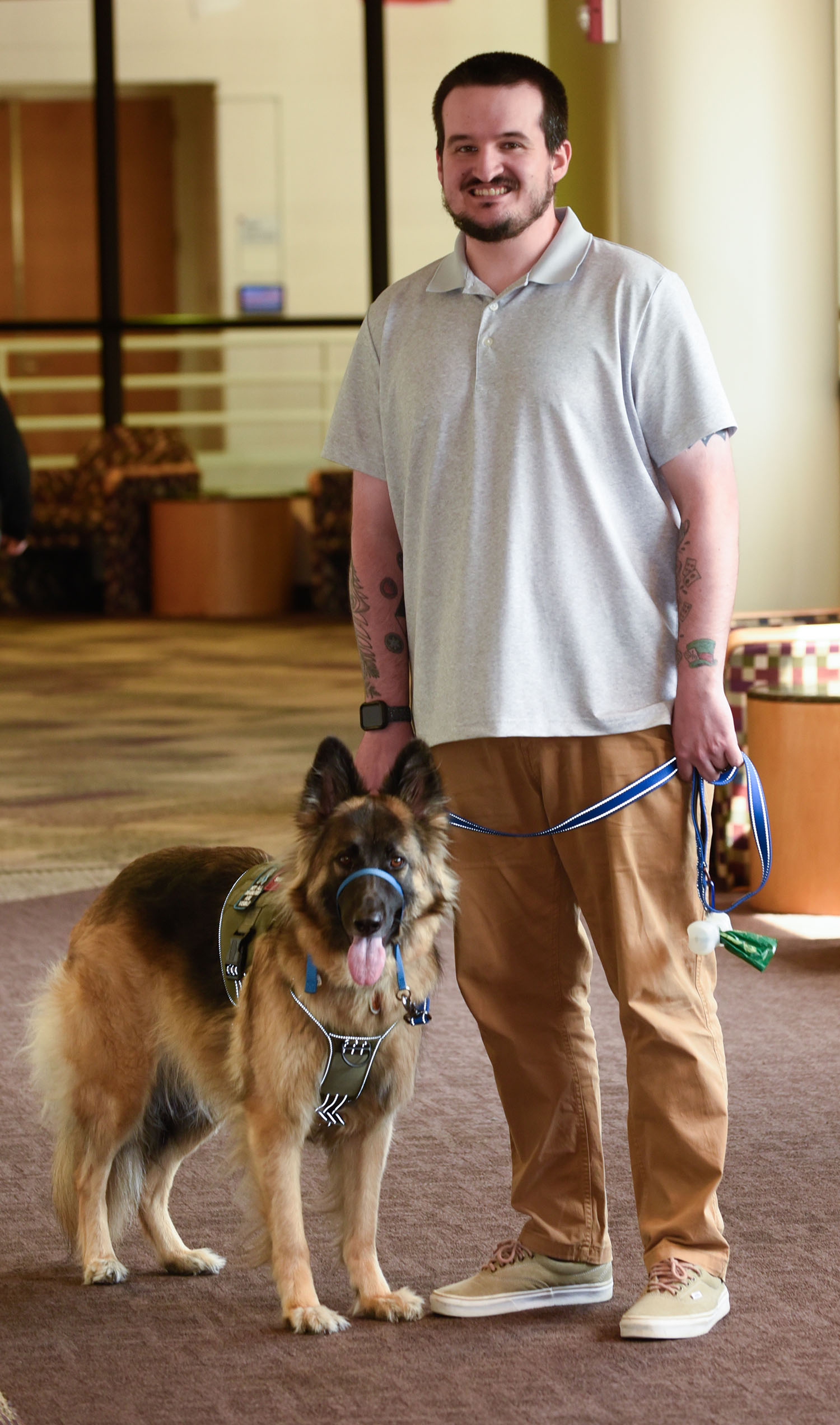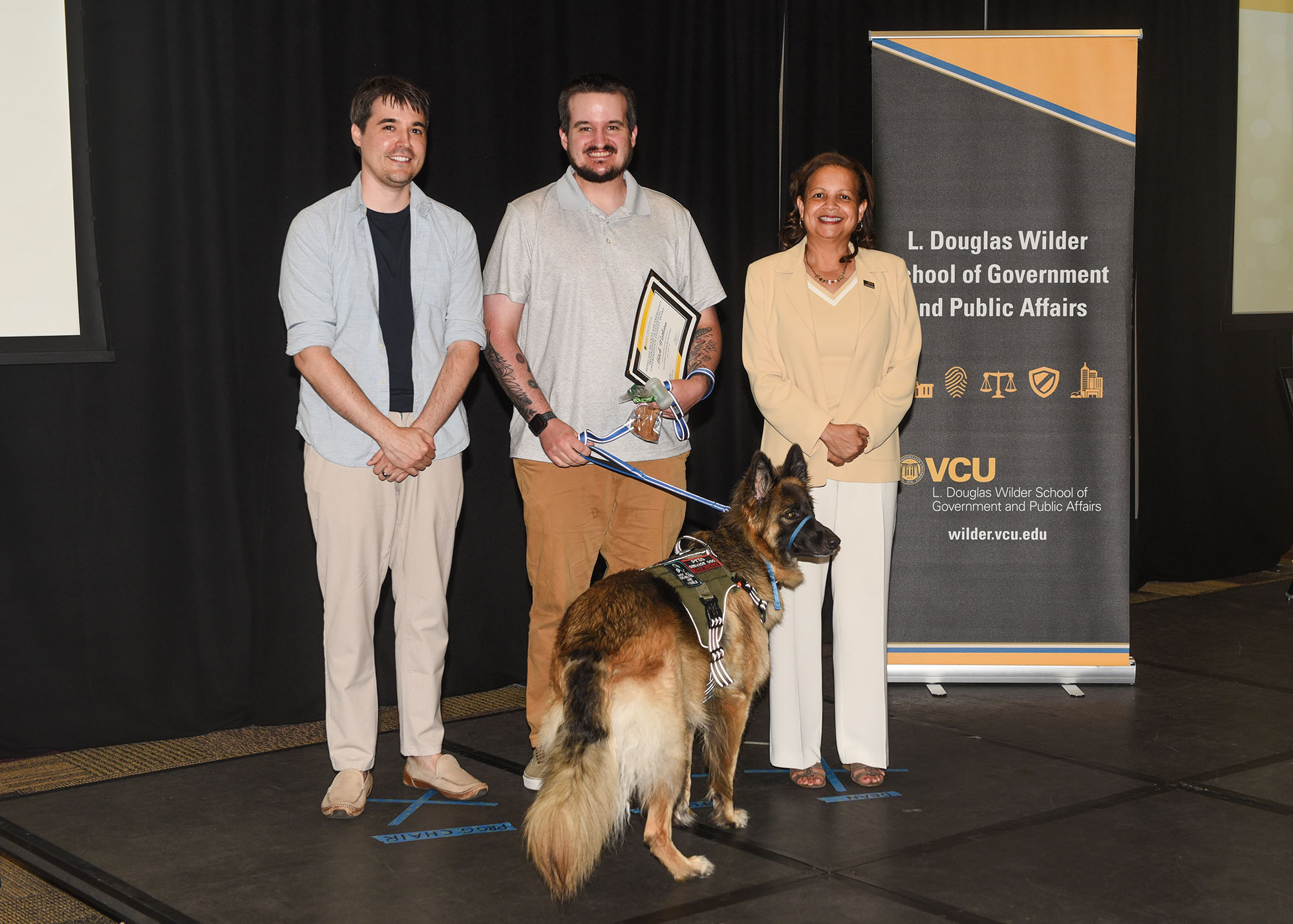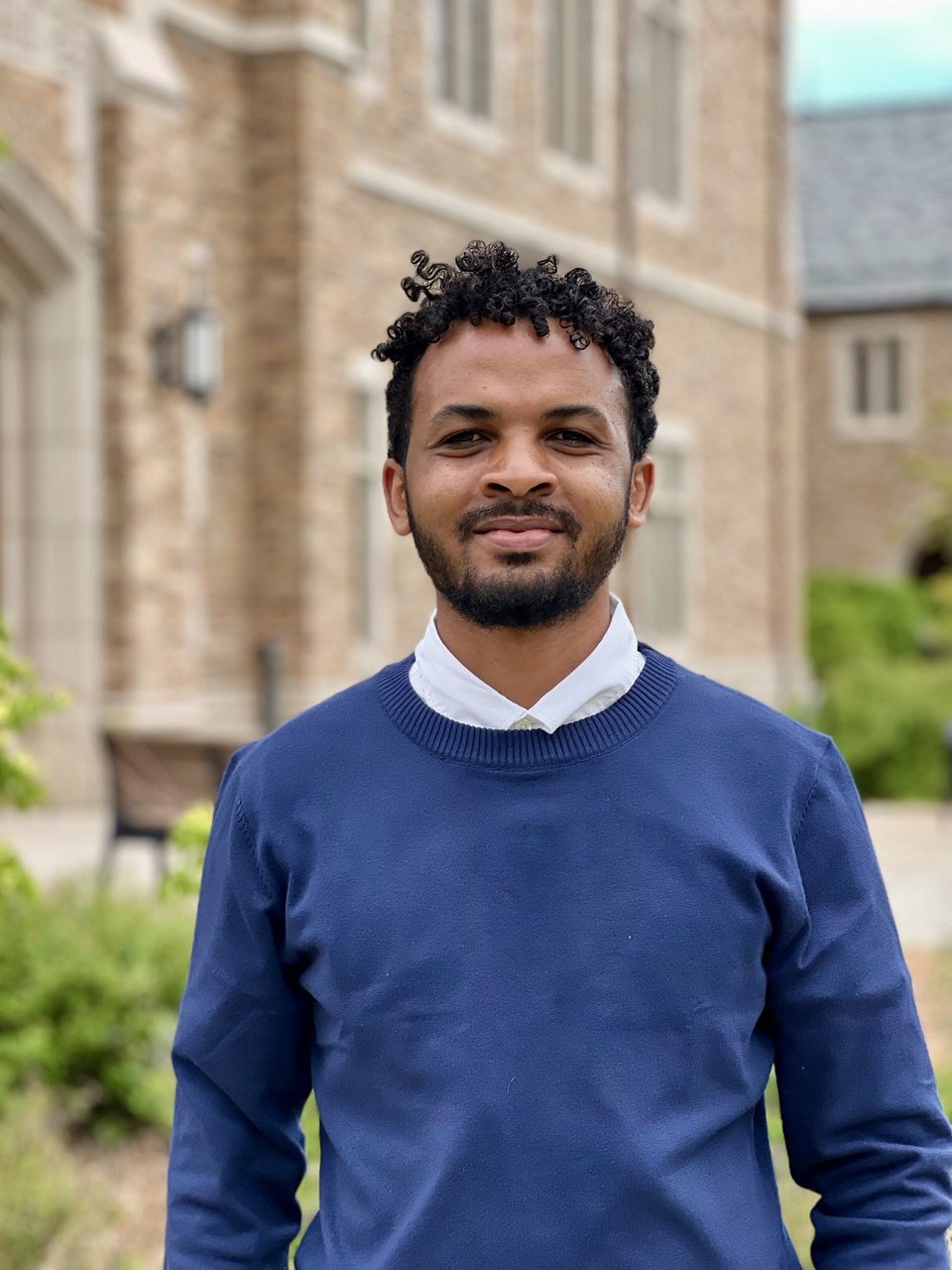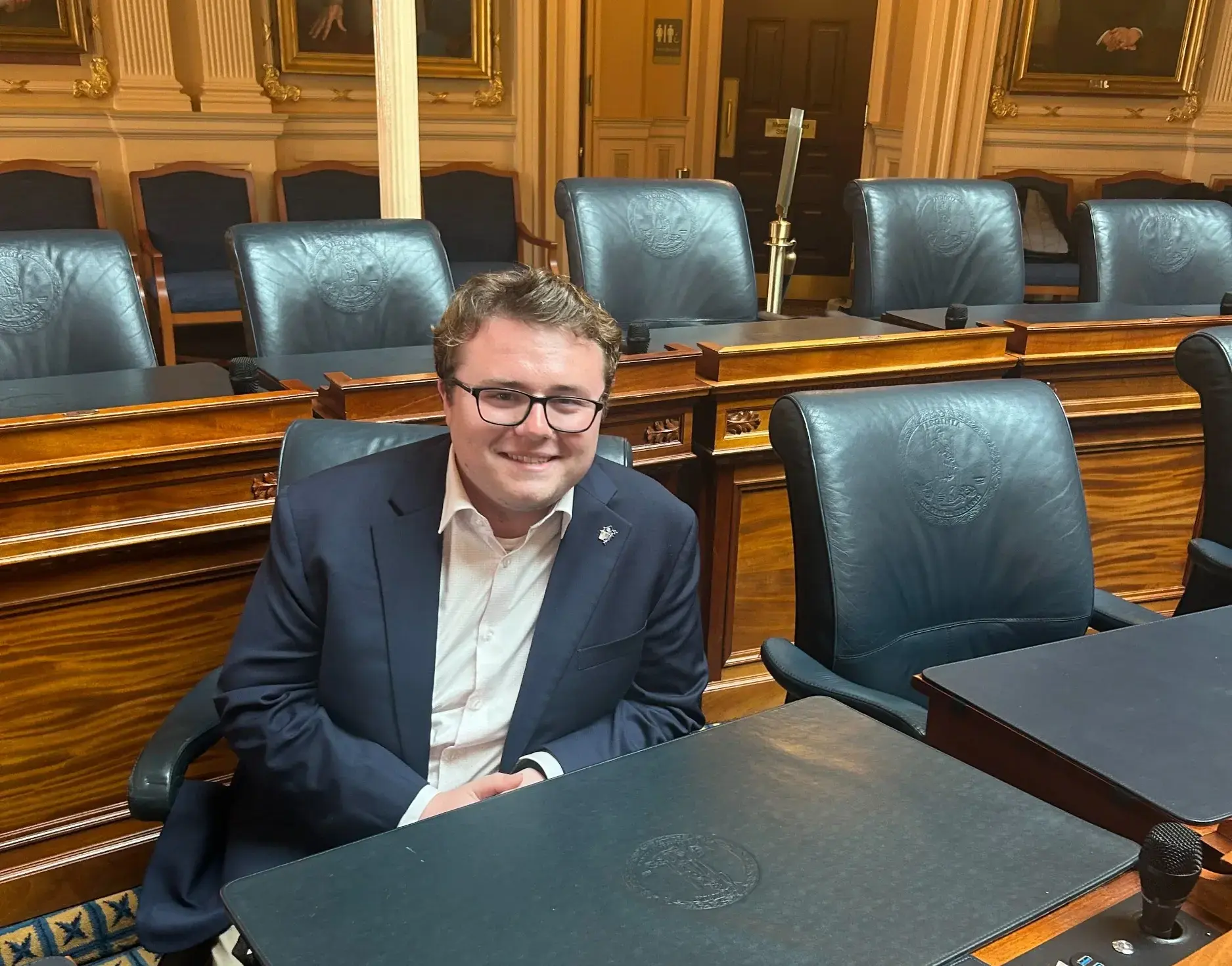Watkins is the L. Douglas Wilder School of Government and Public Affairs Spring Class of 2025 Commencement student speaker.
WATCH WATKINS' COMMENCEMENT SPEECH
With a passion for defense, security and public service, there was no chance U.S. Navy veteran Mitchell Watkins would end his learning at the military level. More awaited the cryptologic technician: an opportunity to build upon his tactical skills and be a builder in the homeland security and emergency preparedness environment.
“Especially after I got out of the Navy, I wanted to continue to serve,” Watkins said. “I was medically retired, so I didn't really have a choice. Even if I wanted to stay, the Navy wasn't going to let me, so I wanted to continue to serve our country, even after the fact.”
In his nine years of naval service, Watkins found his niche in signals and electronic intelligence. He trained in missile defense, mastered time management skills, wrote technical documents and presented complex solutions. As a cryptologic technician, Watkins was an expert in cyber communications. Cryptologic technicians perform a variety of tasks, from jamming enemy radar signals to analyzing encrypted data — all in support of national intelligence efforts. This position is highly secretive and integral to naval operations.
Through these responsibilities, he realized his academic interests leaned more toward the homeland security side rather than emergency preparedness. “I think FEMA and emergency preparedness are very pertinent, and I've enjoyed the course that I've taken, but if I had to choose one side of the corner, I would definitely say security piques my interest more.”
Watkins’s experience in surveillance and strategic guidance meshed well with the Wilder School’s No. 6 nationally ranked homeland security and emergency preparedness (HSEP) program. He was specifically drawn to its human trafficking, terrorism and counter-terrorism courses. Mitchell connected with motivating mentors, professors, and like-minded fellows.
“Mitch is an engaged and thoughtful contributor to class discussions, sharing his insights and experiences in ways that enrich the learning environment,” shared associate professor Maureen Moslow-Benway, M.A., Chair of the HSEP program, who teaches classes in terrorism and U.S. intelligence.
“The important aspect of making connections, whether it's with peers, professors or recruiters at a job fair, is just, you know, be kind.”
– Mitchell Watkins
In forming a network at VCU, Mitchell has learned the importance of gratitude, kindness and empathy. Connections led to community for Watkins to practice kindness — it’s a theme woven through his speech. To him, it’s the one element that opens doors and allows for real change.
Growing skills and expertise
 Watkins spent a year as an undergraduate research assistant working closely with faculty Christopher Whyte, Ph.D., and David Webber, Ph.D., on an innovative, grant-funded project that used machine learning to detect hate-based white supremacist language in social chats on a variety of platforms. Stormfront, founded by Don Black in 1995, was the first major hate site on the internet, claiming more than 300,000 registered members. After the protests following the killing of George Floyd, Stormfront became a primary website to retrieve data from. The work was vital in helping those vulnerable to online recruitment as well as supporting efforts to deradicalize extremist individuals. This project tied into Mitchell’s principles of kindness and respect towards others of all backgrounds — something he was accustomed to after being stationed with sailors from all walks of life.
Watkins spent a year as an undergraduate research assistant working closely with faculty Christopher Whyte, Ph.D., and David Webber, Ph.D., on an innovative, grant-funded project that used machine learning to detect hate-based white supremacist language in social chats on a variety of platforms. Stormfront, founded by Don Black in 1995, was the first major hate site on the internet, claiming more than 300,000 registered members. After the protests following the killing of George Floyd, Stormfront became a primary website to retrieve data from. The work was vital in helping those vulnerable to online recruitment as well as supporting efforts to deradicalize extremist individuals. This project tied into Mitchell’s principles of kindness and respect towards others of all backgrounds — something he was accustomed to after being stationed with sailors from all walks of life.
Watkins remained vigilant in expanding his knowledge and connections in homeland security outside of his studies. He participated in the Wilder School's Virginia Capitol Semester program, where he worked as a legislative assistant to Delegate Marcia Price of Newport News, Virginia. In this role, he developed a Structured Query Language (SQL)-based program to enhance multiple office functions, including data management that significantly improved a malfunctioning awards process.
Out of more than 100 applicants selected for the program, Watkins also conducted policy research and attended legislative meetings in the new General Assembly Building. In his three months as a legislative assistant, Watkins witnessed the Democrats take control of the House of Delegates and Senate, as well as inaugurate its first African-American speaker.
“Working for [Delegate Marcia Price] and her chief of staff, Tempestt Boone, was an awesome three months — a little daunting at first, I think for all of us — but the 2024 General Assembly was awesome,” Mitchell recalled. “It was just a little chaotic with so many firsts, but that kind of made it more memorable and exciting. I'm grateful to the Wilder School for giving me the opportunity. I was grateful to be selected to take part in such a prestigious internship that only comes once a year.”
As an undergraduate representative to VCU’s Honor Council and a member of the Student Conduct board, he’s seen firsthand how empathy can help view a situation at every angle, good or bad, to reach an unbiased, effective solution. “The Student Conduct Board specifically provided an opportunity to look at things from a different perspective,” says Mitchell. “[It] gave me an opportunity to hear the perspective of the student involved and the administrator who gave the complaint. [It] forces you to look at it from their shoes. We find the person not at fault more often than not because their perspective was completely different from the professor's and vice versa.”
Watkins’s academic advisor, Katie Crump, sang his praises in his student speaker nomination.“Mitch is a pleasure to work with and would do an excellent job given his unique perspective, experience at VCU and desire to be a commencement speaker. He truly loves the Wilder School!”
Watkins’ dedication to service extends well beyond his studies and internships. After graduation, he will begin work as a cybersecurity analyst for Huntington Ingalls Industries while finishing his MPA program with the Wilder School online in the summer. Watkins is also grateful for the support of his loyal dog, Zelda, who has attended nearly every class with him. He remembers to carry a selfless mindset, put kindness first, stress the importance of connections and stay rooted in his passion for security intelligence.
“The important aspect of making connections, whether it's with peers, professors or recruiters at a job fair, is just, you know, be kind,” he said.



